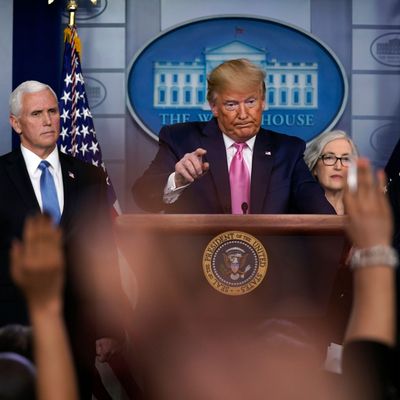
Donald Trump has built his formidable career in public life atop one fundamental insight: What passes for reality in American society is far more malleable than most people are inclined to believe.
The mogul became a great businessman by playing one on TV. He turned himself into a viable candidate for the presidency by having the audacity to present himself as such. And throughout his first term in office, Trump has overcome indisputable evidence of his own gross malfeasance through sheer force of mendacity (along with a little help from his friends). The president’s “fake it till you shake it” strategy has gotten him out of one improbable jam after another. In collusion with Fox News and congressional Republicans, Trump transformed his campaign’s manifestly unsavory contacts with a foreign government into a tale of FBI overreach; his well-documented attempts to engineer legal troubles for his domestic political foes into a story about a “witch hunt” over a “perfect phone call”; and a historic rebuke by members of his own party into “total exoneration.”
Thus, from one angle, the fact that Trump is trying to bluff his way out of an incipient pandemic makes sense.
But from every other angle it’s batshit insane.
The Trump administration’s own health officials have declared the spread of the Wuhan coronavirus (a.k.a. COVID-19) “inevitable,” and implored Americans to prepare for the possibility of “severe” disruptions to everyday life. In Japan, the virus’s arrival has already led Shinzo Abe’s government to shutter all schools for as long as a month. In Italy, efforts to contain the bug have paralyzed the commercial center of Milan. And on Thursday, for the first time, an American who did not travel to an afflicted region was diagnosed with the ailment.
Faced with this set of facts, a rational administration would be crafting its messaging around the assumptions that (1) things are going to get worse before they get better and therefore (2) it’s best not to set the public’s expectations for how comprehensively their president can’t shield them from harm too high.
But Trump’s White House has done the opposite. On Monday, the president declared, “The Coronavirus is very much under control in the USA,” before advising his supporters that the “Stock Market [is] starting to look very good to me!” This proved to be poor investment advice.
And yet, three days, hundreds of new coronavirus cases, and a couple thousand-point declines in the Dow Jones later, Trump reiterated his triumphalist message.
“The risk to the American people remains very low,” Trump said on Thursday. “We’ve done a great job in keeping it down to a minimum … We’re going to be pretty soon at only five people. We could be at just one or two people over the next short period of time.”
On Friday, acting White House chief of staff Mick Mulvaney echoed the president’s baseless assurances, going so far as to paint the market-tanking epidemic as unworthy of news coverage, arguing that its prevalence in the media was wholly attributable to the Fourth Estate’s maniacal desire to hurt Donald Trump politically.
“The reason you’re seeing so much attention to it today is that they think this is going to be the thing that brings down the president,” Mulvaney said of the press’s coverage of coronavirus. “That’s what this is all about.”
Mulvaney went on to liken the Wuhan coronavirus to the flu, despite the former’s higher death rate. “The flu kills people,” Mulvaney said. “This is not Ebola. It’s not SARS, it’s not MERS. It’s not a death sentence, it’s not the same as the Ebola crisis.” COVID-19 has already killed more than twice as many people as SARS did.
The administration’s commitment to prioritizing the projection of a positive image over the acknowledgment of inconvenient truths isn’t limited to its public relations. According to a whistle-blower complaint filed on Wednesday, the Trump administration sent more than a dozen federal workers to welcome the first Americans evacuated from Wuhan, China — the epicenter of the coronavirus outbreak — without providing those workers with proper training in infection control or appropriate protective gear. When the Health Department whistle-blower raised these concerns to her superiors, she says that she was punitively reassigned to a different position within the department. Thirteen of the (allegedly) undertrained workers were sent to aid repatriated Americans while they were kept in quarantine at Travis Air Force Base in Solano County, California. The first known U.S.-contracted case of coronavirus emerged in an area near Travis Air Force Base this week.
It is not clear why the Trump administration believes it’s “nothing to see here” messaging is tenable. An impeachable offense may be in the eye of the beholder. But Fox News can’t immunize its viewers against the reality of a highly contagious disease. And Senate Republicans can’t hold a vote to make an epidemic go away. When Americans start dying, how are these clips of the president assuring the public that it is safe — or of the White House chief of staff scolding the press for covering the public-health crisis, and painting Donald Trump as the supposed outbreak’s primary victim — going to look?
And if the president lacks the requisite foresight to safeguard his own best interests in the face of a pandemic, what does that say about his capacity to protect ours?






























